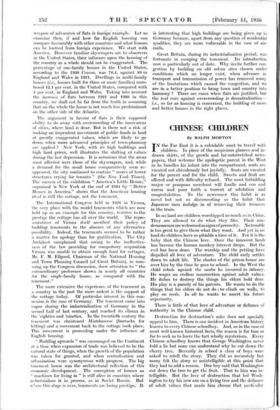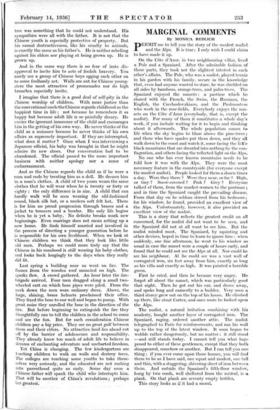CHINESE CHILDREN
By RALPH MORTON
IN the Far East it is a calculable asset to travel with children. In place of the suspicious glances and in- drawn skirts, of the growls and far-outstretched news- papers, that welcome the apologetic parent in the West as he bundles his infant into the compartment, seats are vacated not chivalrously but joyfully. Seats are vacated for the parent and for the child. Sweets and fruit are offered and with difficulty refused. The most forbidding major or pompous merchant will fondle and coa and caress and pour forth a torrent of -adulation and congratulation. To the newcomer this habit is as novel but not as disconcerting as the habit that Japanese men indulge in of >removing their trousers in the train. - .
In no land are children worshipped so much as in China. They are allowed to do what they like. Thtiir mis- demeanours are welcomed as Signs of precocity. No trouble is too great to give them what they *ant. And-yet in no land do children have so pitiable a time of it. For it is the baby that the Chinese love. Once the innocent Iamb has become the human monkey interest drops. But the evil has been done. The worship and the petting-have dispelled all love of adventure. The child early settles down to adult life. The shades of the prison-house are over him by the time he goes to school. In the West the child rebels against the snubs he incurred in. infancy. He wages an endless insurrection against adult values. He itches to destroy the things his elders hold dear. His play is a parody of his parents. He wants to do the things that his elders do not do : to climb on walls, to play on roofs. In all he wants to assert- his future superiority.
There is little of that love of adventure or defiance of authority in the' Chinese child.
Destruction for destruction's sake does not specially appeal to him. There is one incident in American history known to every-Chinese schoolboy. And, as in the case a most well-known historical facts, the reason is for him so far to seek as to leave the fact wholly mysterious. Every Chinese .schoolboy knows that George Washington never told a lie but none can understand why he cut down the cherry tree. Recently in school a class of boys.. were asked to retell the story. They. did so accurately but many felt the story so unintelligible at this point that they had to add a reason. One boy said that Washington cut down the tree to get the fruit. That to him was in- telligible. But the love of destruction that led Wash- ington to try his new axe on a living tree and the defiance of adult values that made him choose that partimflar tree was something that he could not understand. His sympathies were all with the father. It is not that the Chinese youth is especially _protective of property. But his casual destructiveness, like his cruelty to animals, is exactly the same as his father's. He is neither rebelling against his .elders nor playing at being grown up. He is grown up.
And in the same way there is no fear of irate dis- approval to incite him to acts of foolish bravery. You rarely see a group of Chinese boys egging each other on to some foolhardy act. Walls are not for Chinese young- sters the most attractive of promenades nor do high branches especially invite.
I imagine that there is a good deal of self-pity in the Chinese worship of children. With more justice than the conventional uncle the Chinese regards childhood as the happiest time in life : not because he remembers it as happy but because adult life is so painfully dreary. He envies the ignorant innocence of the child and encourages him in the getting of his own way. He never thinks of the child as a nuisance because he never thinks of his own affairs as supremely important. If they are interrupted, what does it matter ? Once when I was interviewing a Japanese official, his baby was brought in that he might admire its new shoes. Our conversation had to be abandoned. The official passed to the more important business with neither apology nor a sense of embarrassment.
And so the Chinese regards the child as if he were a man and ends by treating him as a doll. He dresses him in a man's clothes. A child of two years wears the same clothes that he will wear when he is twenty or forty or eighty : the only difference is in size. A child that can hardly walk will be seen wearing the old-fashioned round, black silk hat, or a modern soft felt hat. There is for him no proud progression through braces and a jacket to trousers and a bowler. His only life begins when he is yet a baby.. No definite breaks mark new beginnings: Even marriage does not mean setting up a new home. He finds himself married and involved in the process of directing a younger generation before he is responsible for his own livelihood. When we look at • Chinese children we think that they look like little old men. Perhaps we could more truly say that the Chinese in his manhood is still wearing his baby clothes, and looks back longingly to the days when they really did fit.
Last spring a building near us went on fire. The flames from the wooden roof mounted on high. The sparks flew. A crowd gathered. An hour later the fire- brigade arrived. Four men dragged along a small two- wheeled cart on which hose pipes were piled. From the neck down the men wore ordinary dress. Above, the large, shining, brass helmets proclaimed their office. They fixed the hose to our well and began to pump. With great noise they unrolled the hose in the direction of the fire. But before beginning to extinguish the fire they thoughtfully ran to tell the children in the school to come and see the fun. But for such consideration Chinese children pay a big price. They see no great gulf between them and their elders. No attractive land lies ahead cut off by the barrier of adolescence and responsibility. They already know too much Of adult life to believe in dreams of enchanting adventure and uncharted freedom.
Yet China is changing. The few kindergartens are teaching children to walk on walls and destroy trees. The colleges are teaching some youths to take them.- selves very seriously, and the educated are not rushing into -parenthood quite so early. SOme day soon a Chinese father will spank the child who interrupts him. That will be another of China's revolutions ; perhips her greatest.















































 Previous page
Previous page